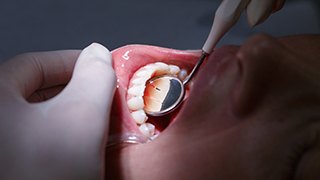Scaling & Root Planing
 Scaling and root planing are usually a dentist’s first line of defense against the early stage of gum disease, better known as gingivitis.
Scaling and root planing are usually a dentist’s first line of defense against the early stage of gum disease, better known as gingivitis.
Periodontal scaling and root planing is a “deep cleaning” used to treat active periodontal, or gum, disease. Gum disease occurs when the gum tissue becomes infected resulting in the loss of bone supporting the teeth. Scaling and root planing procedure removes infection and plaque from under the gums to help with healing and preventing further bone loss. Scaling and root planing, along with excellent home care and routine visits, can help to maintain gum health to ensure a healthy smile.
Most of the time, a deep cleaning can be completed over the course of one or two visits, after which a patient will need to return to Ridgepointe Dental for a follow-up.
If you have red, swollen, or tender gums that tend to bleed whenever you clean your teeth, it may be time for you to get a deep cleaning. To schedule an appointment, please contact us today.
Scaling and Root Planing FAQs

Have you never completed scaling and root planing in the past? Afraid to schedule an appointment because of uncertainty? Dr. Amos is happy to answer any of your questions directly and help put you at ease, ensuring you can protect the health of your gums and overall smile. Below, you’ll find a handful of the most common questions our practice hears, saving you time at your future visit. Need additional clarification? Feel free to give us a call!
Is scaling and root planing painful?
The process of removing calcified plaque and bacteria from above and below the gums can be slightly discomforting, which is why we make sure to provide a local anesthetic ahead of your treatment. This removes any and all sensations during the procedure, ensuring it remains as comfortable as possible. The effects of the anesthetic will remain for the next few hours or so. If needed, you can also take advantage of nitrous oxide sedation to help keep you at ease during your appointment.
How long does it take for the gums to heal after treatment?
Once scaling and root planing is completed, the gums will need time to heal before any additional periodontal therapy can be performed. In most cases, about four to six weeks of healing are needed before any future treatments can be done at our office.
Can I eat anything after completing treatment?
You should avoid eating anything following the completion of scaling and root planing treatment until after the anesthesia has fully worn off. Not only are you more likely to experience sensitivity to hot and cold foods and beverages, but you can easily bite your tongue, cheek, and lips without realizing it. This can lead to cuts inside the mouth, which is the last thing you need following periodontal therapy.
Can teeth fall out after treatment?
Scaling and root planing do not cause teeth to become loose. This is because deep cleaning does not remove the part of the tooth that helps keep it attached to the gum and bone. This is known as the periodontal ligament, a portion that is only removed during a tooth extraction. However, if you do notice your tooth feeling loose following treatment, please call us right away.
How often will I need to visit following my treatment?
While patients with positive oral health only need to visit once every six months for routine exams and cleanings, those who need scaling and root planing will likely need to come in more often. This is because gum disease has the potential to come back when not carefully monitored. We will typically recommend that you visit us for additional treatment every three to four months.
